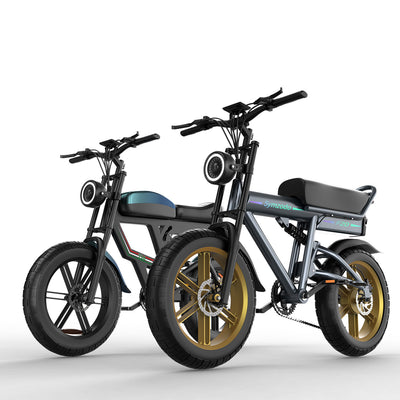Thinking about riding an e-bike around New Jersey or taking it on the road to another state? You're not alone. Electric bikes are booming, but figuring out where you can ride—and what’s allowed—can be tricky. That’s where knowing New Jersey e-bike laws comes in handy, along with a look at how different states handle things.
This quick guide explains the e-bike class system, state-specific rules, helmet laws, and where you’re allowed to ride. Let’s make your next trip safe, smooth, and 100% legal.
What Class of E‑Bike Do You Have?
Before diving into specific laws, you need to know your bike’s classification. Most U.S. states, including New Jersey, use the e-bike class system to regulate how electric bikes are treated on public roads and trails.
Here’s a breakdown of the system:
-
Class 1: Pedal-assist only, maxes out at 20 mph
-
Class 2: Throttle-powered but still capped at 20 mph
-
Class 3: Pedal-assist, with a top speed of 28 mph
The e-bike class system is more than just labels—it determines where you can ride, if you need a helmet, and how your bike is regulated. So before anything else, figure out which class your e-bike falls into.
New Jersey E‑Bike Laws Explained
New Jersey e-bike laws are fairly straightforward, but there are a few key details to know.
Class 1 and Class 2 e-bikes:
These are the most accessible options. In New Jersey, they’re treated just like traditional bicycles.
-
No license, registration, or insurance required
-
You can ride them on roads, bike lanes, and most multi-use paths
-
No minimum age requirement
Class 3 e-bikes:
These are faster and come with stricter rules.
-
Riders must be at least 16 years old.
-
Helmets are mandatory—no matter your age.
-
Allowed mostly on roadways and select bike lanes, but may be banned from certain trails or shared paths
Local Laws Still Apply
While New Jersey's e-bike class system provides clear statewide regulations, local municipalities and park systems can enforce their own rules. That means a Class 2 bike may be legal on a city bike lane but restricted on a nearby nature trail. If you're planning to ride in state parks, beaches, or scenic paths, understanding New Jersey e-bike laws is crucial. Always check signage or online maps before you roll in.
How Do Other States Compare?
Curious about how things work outside New Jersey? E-bike regulations by state can vary a lot. Some states are more flexible, while others treat e-bikes more like motor vehicles.
Here’s a quick look at how other states handle things:
-
California: Fully adopts the three-class system. Class 1 and 2 are widely accepted on trails and bike lanes.
-
New York: Recently legalized e-bikes. Class 1 and 2 are allowed in most areas, but Class 3 bikes face more limits.
-
Texas: Mirrors the federal class system and treats e-bikes like traditional bikes with few restrictions.
-
Pennsylvania: Requires registration for some models that don’t fit neatly into the e-bike class system.
Knowing e-bike regulations by state helps if you're planning to travel with your bike or ride in different regions. What’s legal in New Jersey might not fly in another state, so check before you go.
Legal Riding Tips for Every Rider
Following the rules isn’t just about staying legal—it keeps you and others safe. Whether you’re sticking to New Jersey e-bike laws or learning about e-bike regulations by state, here are some simple tips to help you ride smart.
Helmet Requirements
In New Jersey, helmets are mandatory for riders under 17. For Class 3 e-bikes, helmets are required for all ages. Even if it’s not required, wearing one is always a good move, especially when cruising in busy areas or at higher speeds. Other states vary, so check local laws before riding out of town.
Where You Can Ride
Knowing where your e-bike is allowed makes a big difference:
-
Class 1 and 2: Usually allowed on bike lanes, roads, and multi-use trails
-
Class 3: Typically limited to roadways and sometimes dedicated bike lanes
-
Off-road or trails: May be restricted depending on the park or local rules
Even within New Jersey, park systems and cities can set their own policies. So while New Jersey e-bike laws allow a lot of flexibility, always look for signs or posted regulations.
Quick Recap for Riders
Understanding New Jersey e-bike laws is the first step toward safe, legal riding. By knowing your bike’s class, checking local rules, and comparing e-bike regulations by state, you’ll avoid confusion and ride confidently. The e-bike class system simplifies much of this, but staying updated matters too.
If you're not sure which e-bike fits your needs or want a legal model worldwide, explore new options or contact us—we’re always happy to help.


